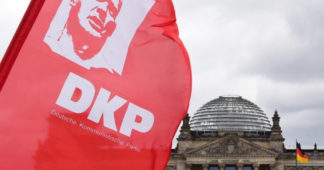The ‘House of Graz’ – For the First Time, a Communist Elected Mayor in Austria’s Second-Largest City
19 Nov 21
On 17 November Elke Kahr, chair of the Communist Party of Austria (KPÖ) Graz, was confirmed as Mayor in the constituent session of the Graz Municipal Council.
Already on the previous Saturday she, together with Green Vice-Mayor Designate Judith Schwentner and the Social Democratic (SPÖ) spokesperson in the Council Michael Ehmann, presented the coalition programme ‘Together for a New Graz’. The ‘House of Graz’ stands for the transparency ‘of decision-making structures in areas ranging from personnel policy to party and delegation finance’.
Continue reading at www.transform-network.net
Today, the newly elected municipal council in Graz, Austria, voted in the new local administration. Elke Kahr became the first woman mayor and the first mayor from the Austrian Communist Party, the KPÖ (Kommunistische Partei Österreichs).
In an unexpected turn of events, during the September election, Elke Kahr and the KPÖ were able to beat the longstanding incumbent mayor Siegfried Nagl of the Austrian People’s Party (ÖVP). After that, the KPÖ were able to form a coalition with the Greens and the Social Democratic Party (SPÖ) around key social issues, as well as ecological issues.
Continue reading at www.themayor.eu
A Day That Changed Not Only Graz
For the first time since 1945 in a large Austrian city, the second largest in the country with about 300,000 inhabitants, the bourgeois candidate was voted out in favour of a Communist. Long-time mayor Siegfried Nagl (ÖVP – conservative) suffered heavy losses, while the KPÖ under city councilwoman Elke Kahr came out in first place.
For Communists the figures are stunning: KPÖ (Austrian Communist Party) 28.8% (previously 20.3%), ÖVP 25.9% (previously 37.8%), Greens 17.3% (previously 10.5%), FPÖ (extreme right) 10.6% (previously 15.9%), SPÖ (Social Democratic Party) 9,5% (previously 10.0%), NEOS (liberal) 5.4% (previously 3.9%).
Continue reading at www.transform-network.net
The Electoral Success of the Radical Left: Explaining the Least Likely Case of the Communist Party in Graz
Recently, scholars have shown a growing interest in radical left parties (RLPs). In terms of electoral success, the rise of the KPÖ Graz, the Communist Party in Austria’s second biggest city, represents perhaps the most counterintuitive case in Western Europe. Adding to previous studies, the rise of the KPÖ Graz contradicts many of the claims made and patterns found about the conditions for the electoral success of RLPs. While the national KPÖ was voted out of parliament in 1959, the Graz branch has been a member of local government since 1998. Since then, the party has managed to gain 20 per cent of the vote in three out of four elections. In 2017, the KPÖ defended its place as the second largest party in local legislature and stayed ahead of the radical right FPÖ, on the rise at the national level. In stark contrast to the Communists’ current strength, however, they did not gain even 2 per cent of the vote in 1983. This analysis shows how the party has managed to ‘own’ the issue of housing and to exploit local political opportunities in order to be electorally successful. The findings point to the importance of agency and the subnational level for RLPs, and highlight more general questions in the study of this party family.
Continue reading at www.cambridge.org
We remind our readers that publication of articles on our site does not mean that we agree with what is written. Our policy is to publish anything which we consider of interest, so as to assist our readers in forming their opinions. Sometimes we even publish articles with which we totally disagree, since we believe it is important for our readers to be informed on as wide a spectrum of views as possible.











